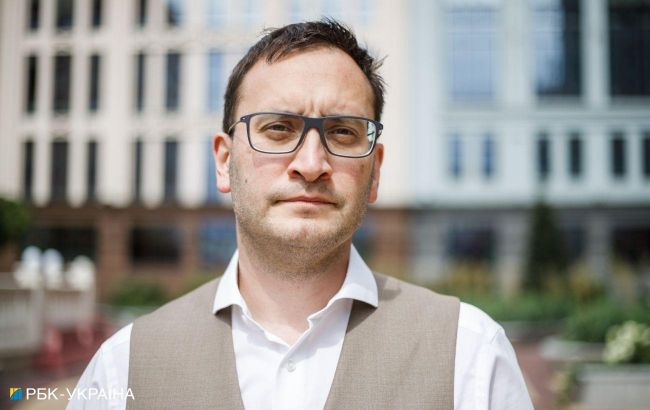The world must invest in Ukraine to rebuild the health sector
 Photo: Dr. Jarno Habicht, WHO Representative in Ukraine (RBC-Ukraine, Vitaliy Nosach)
Photo: Dr. Jarno Habicht, WHO Representative in Ukraine (RBC-Ukraine, Vitaliy Nosach)
WHO Representative in Ukraine, Jarno Habicht, on the need for investments in Ukraine to restore healthcare infrastructure.
The full-scale invasion of Ukraine by the Russian Federation on February 24, 2022, led to extensive destruction of social and economic infrastructure in the country, particularly in the healthcare sector.
The World Health Organization (WHO) has confirmed over 1004 attacks on the healthcare sector, resulting in damage or destruction of medical facilities, including hospitals and pharmacies, with more than 100 healthcare workers killed and dozens injured.
As we have witnessed firsthand, especially during recent visits to areas near the front line and other war-affected zones, these attacks have significantly impacted people's access to essential healthcare services and medicines.
Despite the devastation and ongoing war, Ukraine's healthcare sector's recovery and reconstruction process is in full swing. According to national authorities, over 600 damaged healthcare facilities have been partially or fully repaired as of June.
However, there are still many challenges, including an urgent need for additional resources. According to a joint assessment conducted by the Ukrainian government, the World Bank, the European Commission, and the UN in February 2023, the total financing needed for the recovery of the healthcare sector amounts to approximately $16.4 billion. This year alone, more than $3.6 million has been urgently required to meet immediate needs, and this calculation was made before the destruction of The Kakhovka Dam, which significantly increased the urgent requirements.
Last week, the international community gathered at the annual Ukraine Reform Conference in London. Considering the aforementioned and to contribute to the discussion on the recovery of the country's healthcare sector, the WHO representation in Ukraine has published new material.
As part of this material, we visited four inspiring examples of (partial) recovery and reconstruction in areas liberated from the temporary control of Russian forces, where significant damage and destruction occurred.
The outcome of just one of these examples demonstrates the breadth of challenges ahead of us and the opportunity to build something better than before. (Here is the full report with all four examples of (partial) recovery).
The pharmacy network "Apteka 911" from the Kharkiv region has 174 pharmacies in the city and surrounding areas. A significant part of this region was under Russian military occupation for several months following the start of the invasion, enduring intense fighting with Ukrainian forces from mid-May to early September 2022.
However, bombardments continue to cause chaos, resulting in hundreds of civilian casualties. At least 58 pharmacies in the network were damaged or destroyed, with two employees killed and many others injured.
After the territory returned under Ukrainian control, despite disruptions in electricity, water supply, heating, and medication supply routes, the network used its savings to finance the restoration and reopening of pharmacies. Now, in many communities, these restored pharmacies are the only source of medical assistance available to the local population.
The government engaged this network in the distribution of outpatient medications under the state program "Accessible Medicines," the network became a channel for directing humanitarian supplies to regions with high needs, leveraging its logistical potential and knowledge of local realities.
The network is also involved in several innovative approaches to conducting business, including mobile medicine delivery, online consultations for patients in recently liberated cities (many of which lack functioning medical facilities due to extensive damage), and mail delivery of medications.
As illustrated by this pharmacy case, domestic Ukrainian enterprises, the public sector, and other organizations have played a crucial role in restoring access to healthcare in the most war-affected areas.
That also highlights a broader pattern: many investments in recovery and reconstruction have not relied on external funding sources. They have been carried out by Ukrainians themselves—people on the ground.
For organizations like this pharmacy, their savings are the only source of capital for such investments. However, these savings are limited and will deplete further as the war continues. Consequently, the needs will grow as the war shows no signs of abating.
Therefore, to sustain the future recovery of the Ukrainian healthcare sector, more external investments and other forms of financial support will be needed, particularly from international and charitable organizations and the private sector.
Ukraine initiated ambitious healthcare system reforms long before the full-scale Russian war began. These reforms laid the groundwork that helped the system withstand these 16 months of war. The world can and should play an even more significant role now in supporting the recovery of the healthcare sector—a key pillar of Ukraine's resilience against current challenges and its pursuit of a better future for its resilient people.
This material was prepared in collaboration with Dr. Mark Gellwell, WHO consultant and Professor at the University of Edinburgh, and Kateryna Fyschuk, Health Policy Development Specialist at the WHO Country Office in Ukraine.

